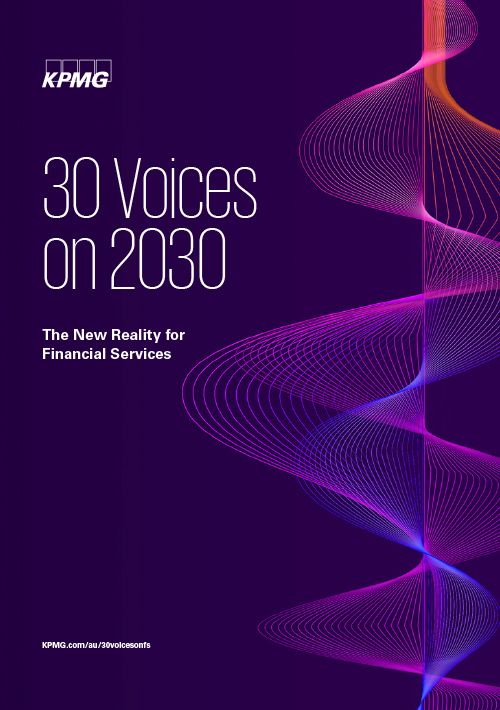Few of us would have predicted the 2020 we have all experienced. Which is why projecting forward a decade and asking what the financial services industry will look like in 2030 is an almost impossible task.
But we have given it a go.
KPMG has brought together 30 distinguished leaders in financial services and beyond – insiders, outsiders and challengers – to piece together what the industry landscape of 2030 could look like.
In our report, 30 Voices on 2030 – The New Reality for Financial Services, our industry experts explore a broad range of issues, such as changing societal expectations, emerging business models and regulatory frameworks. Their predictions for the industry span the six areas in which KPMG also envisages dramatic change.
Six areas of disruption
Find out what the 30 voices have to say:
The upshot? Write your future now
The views of our featured experts have influenced this list of ten key considerations you should address now.
- Get clear on your purpose. Will it align to the likely consumer and stakeholder expectations of 2030? How are you aligning your strategy, investments, systems and processes to underpin and live your purpose? If you are trusted, you will succeed.
- Protect and remediate your data environment. How you manage customer data and privacy will be your Achilles heel. Build a robust security architecture, hire the best talent and partner where required to give you and your customers assurance that their data is safe in your hands.
- Tackle your technology environment. How will your legacy systems prevent you from being a player in the new reality? Will you invest to upgrade your existing systems or will you turbo-charge your transformation by acquiring an existing capability in the market or establishing a new stand-alone entity?
- Determine the role you will play in the ecosystem. Are you going to be the orchestrator of an alliance between partners or will you be a participant enhancing the overall customer experience? Determine the criteria you’ll be enforcing to decide who you partner with — this will be influenced by how you balance the capability of an alliance partner with their purpose and values.
- Determine how you will bridge the capability gap. Will you build, buy or partner? What is the path of least resistance to achieving your strategy? Who and what do you need to help you achieve it? What parts of your business or operating model would benefit the most from partnering rather than continuing to exclusively build in-house?
- Simplify and become more nimble. How are you creating a culture that embraces radical simplicity? What elements of your business will continue to be core in 2030? What measures are you taking to build agility into your business and create an entrepreneurial spirit?
- Articulate your strategy to develop new sources of revenue and begin pivoting your organisation’s people, processes and technology around them. How will you derive and deliver the kind of value your customers will pay for? How can partnerships and alliances become a new source of revenue? Are fee and subscription-based models within the realm of possibility?
- Go hard after the best talent globally. How will you retain this talent once you’ve got it? What skill sets will you prioritise to succeed in an industry that will be dominated by technology, the quality of its customer experience and the need to cooperate effectively with partners?
- Begin experimenting with digital currencies and blockchain to broaden understanding of the technology and its capabilities. Engage globally to maintain a finger on the pulse of international developments. Determine what role, if any, your organisation will play in the digital currency ecosystem.
- Continue to reimagine the future. The past year has taught us just how uncertain the future might be. Are you prepared for the scale of change required? Do you have the organisational appetite to adapt your business model? What is your rhythm for understanding industry signals and gaming out scenarios?
KPMG knows that the future can be designed, prepared for, solved for and aspired to. 30 Voices on 2030: The New Reality for Financial Services aims to provide you with the impetus you need to act today to build the future we all want for tomorrow.
Would you like to discuss the report or the ten key considerations to see how you can get ready for 2030? Contact one of our leaders or authors below.
Key contacts
Connect with us
- Find office locations kpmg.findOfficeLocations
- kpmg.emailUs
- Social media @ KPMG kpmg.socialMedia






















